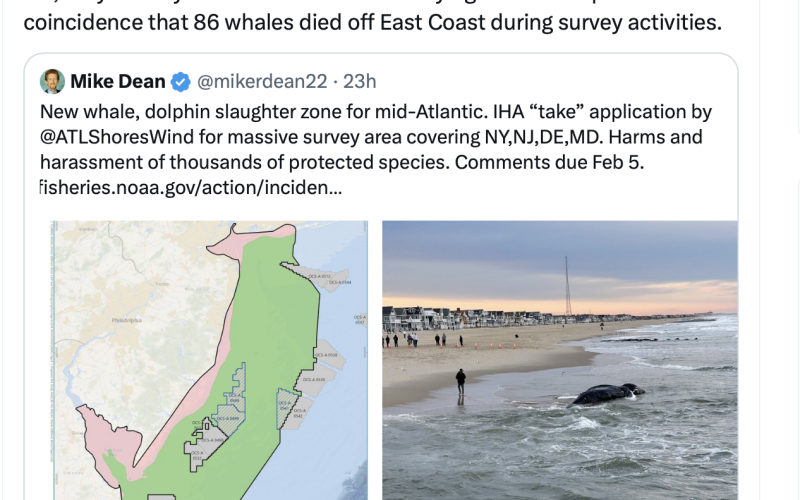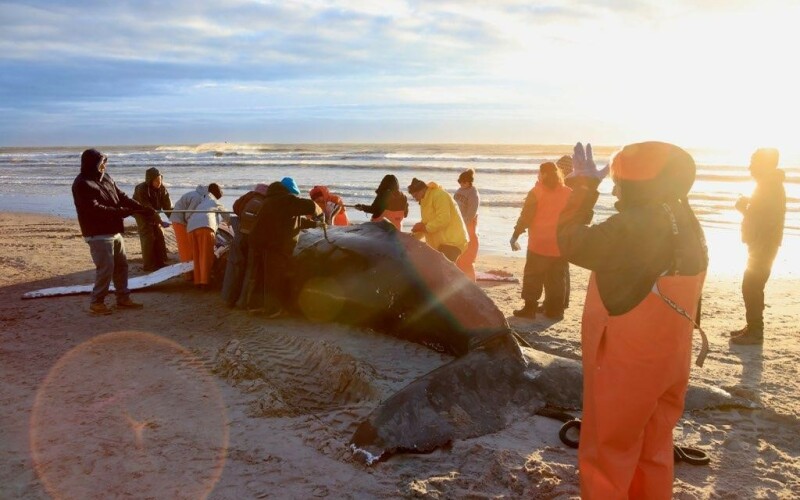Even as some offshore wind projects founder, other developers are pressing on with survey work and construction plans off the U.S. East Coast – and the federal permits they need because the work can affect whales and other marine mammals.
The recent “incidental take” application from New Jersey developers Atlantic Shores – a joint venture by Shell New Energies and EDF – distinguishes between what the National Oceanic and Atmospheric Administration calls prohibited “Level A” injury or death of marine mammals, and “Level B harassment” of animals being disturbed by survey vessel activity, according to a Jan. 5 public notice from NOAA.
The application from Atlantic Shores seeks the Level B permit to continue surveying three lease sites off Long Beach Island and Brigantine Island on the New Jersey Shore – two leases near the barrier island communities, and a third farther offshore beyond ship traffic separation lanes that extend south from the New York Harbor approaches.
Atlantic Shores is now the major offshore wind project proposed off New Jersey, after the Oct. 31 decision by Ørsted to cancel its plans for Ocean Wind 1 in the face of escalating costs. In early January Equinor and bp, partners in the Empire Wind 2 project off New York, cancelled their power purchase agreement with state officials, citing the same economic factors.
Offshore wind opponents cheered those surprise moves – and are hopeful Atlantic Shores could likewise be forced to reconsider. The incidental take applications are another front in their fight.
“Here it is folks,” the New Jersey group Save Long Beach Island declared Jan. 8 on its account with X (formerly known as Twitter). “Atlantic Shores Wind request for "Takes" meaning their incidental harm & harassment of protected species. Yet when whales die, they will say it's not from OSW surveying.”

A series of dead humpback whales stranding on New Jersey and New York beaches in the winter of 2022-2023 swung public opinion toward more skepticism of offshore wind projects by last spring, according to university polling.
The strandings and media attention faded, but opposition groups who saw that power remain focused on challenging federal regulators on marine mammal protections. Humpback strandings from Maine to Florida spiked to 37 animals in 2023, up from a previous peak of 33 in 2020, part of an “unusual mortality event” that NOAA scientists have been tracking since 2016.
A Dec. 23 story by the Associated Press reported that “in recent months, conservatives including former President Donald Trump have claimed construction of offshore wind turbines is killing the giant animals.”
“Scientists say there is no credible evidence linking offshore wind farms to whale deaths,” AP reporters wrote. “But that hasn’t stopped conservative groups and ad hoc ‘not in my back yard’-style anti-development groups from making the connection.”
The story prompted days of furious pushback from activists and conservative media.
“That’s true. But there’s also no evidence that smoking directly causes cancer. Nor is there evidence that more carbon dioxide directly warms the planet,” Michael Shellenberger, a wind energy critic who works with the opposition group Save the Right Whale, wrote on Substack Jan. 8. “AP is playing the exact same, deliberately misleading, game that it accuses the tobacco and fossil fuels industries of playing.”
“Associated Press Gets It Wrong: Wind Farm Contractors Acknowledge Turbines Harm Dolphins, Whales,” the conservative Daily Signal headlined a commentary by Diana Furchtgott-Roth of the Heritage Foundation.
Brown student authors Isaac Slevin, William Kattrup and professor J. Timmons Roberts wrote about “deeply interwoven relationships between new grassroots- appearing anti-offshore wind (anti-OSW) groups and known fossil fuel-allied actors in the conservative movement. Though journalists have illustrated specific connections between local actors and national interests, no cohesive understanding of offshore wind opposition exists.”
They say the “report reveals how these East Coast offshore wind opponents are not solely local – they are embedded in a network of seasoned fossil fuel interests and climate denial think tanks that have perfected obstruction tactics for decades.”
Critics see the U.S. offshore wind industry as seriously weakened, and even experienced offshore service operators foresee 2024 as a year when developers will need to regroup – and rebid those projects if Northeast states allow. It’s a volatile mixture in a national election year.




